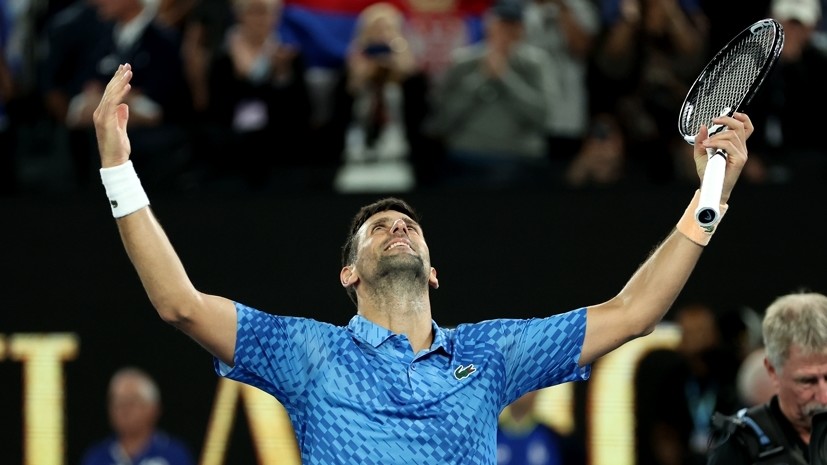For Novak Djokovic, this day could be special.
If successful, he not only made another entry to win the Grand Slam, which he was very close to in 2021, but also forever inscribed his name in the history of not only the Australian Open, but world tennis in general.
The Serbian could have become only the second athlete to win one of the Majors ten or more times, and also come out on top in total number of TSH wins.
So far, Rafael Nadal has held the lead with 22 trophies, while the Belgrade native had one less.
Only problems with his left hip could prevent him, which did not allow him to demonstrate his maximum throughout the entire championship, as well as Stefanos Tsitsipas, who rushed at full speed to his first triumph at the Majors.
In Melbourne, the Greek performed impressively and lost only three sets in total, and only one of them in the semi-final with Karen Khachanov, which lasted just over three hours.
Thus, the fourth racket of the world could hardly be tired on the eve of a decisive confrontation.
But even this hardly seriously increased his chances of winning.
Indeed, in the final, he was expected to meet with the most uncomfortable opponent among all the representatives of the ATP tour.
Previously, Tsitsipas shared the court with Djokovic 12 times, but only twice won, and by this time the series of failures had already totaled nine matches.
And one of them turned out to be especially offensive.
A year and a half ago, the Serbian beat the Greek in the final of Roland Garros and prevented him from establishing himself as the leader of a new generation of tennis players.
And in the first set, the impression was that Tsitsipas is still not ready to fight on equal terms with the former first racket of the world.
Although he was higher in the updated ATP ranking, he looked extremely uncertain.
On the very first pitch, he was forced to win back two break points at once, but if this time he succeeded, then the next he could not prevent Djokovic from achieving his goal.
Moreover, the Greek himself gave him a game, making a double fault with the score 30:40.
In general, in the actions of Tsitsipas, excessive nervousness was felt.
He tried to complete the pranks as quickly as possible, but the haste only hurt him.
Only in the first game, he allowed 11 unforced, unsuccessfully shortened several times, allowing Djokovic to successfully reach the net.
But worst of all, Stefanos was absolutely uncompetitive at the reception.
For the whole set, he took only one point on Djokovic's first serve and only three on the second.
Naturally, there could be no talk of break points.
Perhaps Tsitsipas needed to fail at the start in order to loosen up and finally play at full power.
Already in the second game, the usual sharpness appeared in his attacks: branded crosses regularly landed on the back line, even the problematic one-handed backhand did not fail.
And although offensive misses have not gone away, they were more than able to compensate for the expense of actively won balls.
All this together helped Stefanos not only never lose a pitch, but also prevent Novak from earning a break point.
The Serb himself was also not too generous and gave the Greek only one opportunity to succeed at the reception.
But he took it away.
Nevertheless, the set turned out to be extremely nervous.
But if Tsitsipas had reason to worry, Djokovic's regular breakdowns were surprising.
Moreover, their number increased markedly after, in the sixth game, he unsuccessfully ran for a distant ball, stumbled and collapsed onto the court, recalling his health problems.
But this did not stop him from reaching the tie-break, where he took the upper hand in a dramatic fight.
For two, the opponents allowed seven mini-breaks, but at key moments Novak was again better.
It seemed that this failure could break Tsitsipas, but Djokovic himself suddenly relaxed a little.
In the very first game, he first made a double, and then made a couple more misses and helped his opponent take the lead.
But Novak wouldn't be himself if he didn't demonstrate champion character.
The Serb immediately made a reverse break and did not allow the Greek to come off.
Subsequently, everything developed in the same way as in the second game.
Tennis players took their own serve very confidently and prepared for the second tie-break in a row.
And for Stefanos, this was hardly an ideal development of events, because he was already inferior in the previous four.
And this time the shortened game began catastrophically for him.
Novak was left with the first five draws, and there were practically no hopes for a comeback.
To the credit of Tsitsipas, it is worth noting that he did not stop fighting and took a total of five points, two of which were on match points.
But he couldn't play everything.
Djokovic extended his unbeaten streak on the courts of Melbourne to 28 meetings, won the Australian Open trophy for a record tenth time and caught up with Nadal in the number of TSHs won.
Novak reacted to the triumph in his usual emotional manner.
He climbed into the boxing of his team, hugged the coaches and sobbed, after which he sank to the ground exhausted.
All this went on for several minutes, after which the touched Djokovic returned to the court and cried again - already on the bench.
And he could be understood.
After going through an extremely difficult period and missing two "majors" at once by the decision of the organizers, he returned even stronger and again won the title of the first racket of the world.

